Part 3 The Shero Family
3.1 Introduction to the Shero family
Lucy Shinners
Family genogram
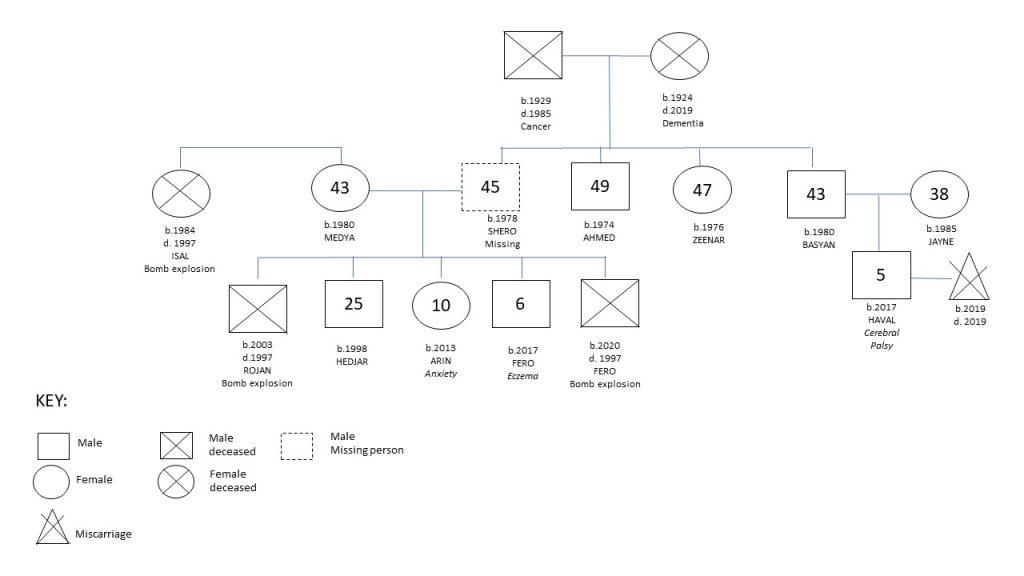
 Introduction to family and community
Introduction to family and community
This part provides case studies about an Iraqi refugee family of 4, Medya and her 3 children, Hedjar, Arin and Fero. The United Nations resettled them in the seaside town of Coffs Harbour after they escaped from Iraq, making a very difficult journey to Lebanon for safety. They took some time to settle into their new surroundings after the family was rescued. Still, they have now learned the language and have begun rebuilding their lives. They have developed a deep connection to the Coffs community and continue to heal and recover from the trauma they witnessed. This part illustrates how one family experiences life as refugees in Australia, the challenges they face navigating the healthcare system with English as a second language, and their journey of recovery from trauma. The part begins with a section that outlines the family’s background, history and relationships, followed by a brief overview of their lifestyles. The part describes 2 case studies: 1) Medya develops ulcerative colitis, and 2) Medya has a temporary stoma.
The Shero family

Medya and her family are refugees from Baghdad, Iraq. They live in the beautiful seaside town of Coffs Harbour on the mid-North Coast of New South Wales. Medya, the mother of this family, is 43 years old and has 3 surviving children, Hedjar aged 25, Arin aged 10, and Fero aged 6.
Six years earlier, this family’s village was attacked by the militant groups Islamic State of Iraq and the Levant (ISIL). Medya, who was pregnant at the time, lost 6 family members, including her sister (pictured in the family photo) and 2 children, her daughter Denah, aged 3, and her son Rojan, aged 15. As their village was destroyed during the fighting, the family was forced to live in a run-down flat with limited electricity and access to drinkable water. They had to rely on food aid from international volunteer agencies. When Medya’s husband joined the army to fight on behalf of their people, the Yazidis, living and supporting her remaining 2 children became very difficult on her own. They lived in extreme poverty. Medya had to work long hours, carting dangerous building rubble to the rubbish site, to provide enough money to buy food or medicine. The United Nations supported the family by ensuring the village had clean drinking water, blankets and basic food supplies. However, Medya’s family lived in a small room with barely enough food to share. If her kids became unwell, she had to risk her life to seek medical help.

The situation worsened when her son Hedjar was attacked and shot 3 times in the leg and arm while he was praying. While he survived the attack, he was left with an acute brain injury with intermittent seizures and this event forced Medya and her children to leave her husband and escape through the mountains into Lebanon as refugees to seek medical support.
The walk through the mountains was extremely difficult. Medya often had to wrap her children’s feet with clothes to help them walk, or hide them when they could hear militants approaching. After 9 days of travel they joined other refugees, but it took many weeks for Medya and her children to recover from the ordeal. When she was 28 weeks pregnant, Medya thought she would lose her baby as she suffered much pain and bleeding. However, with medical attention and rest, her body recovered, and she remained pregnant. It was not until she would arrive in Australia that she would deliver her child.
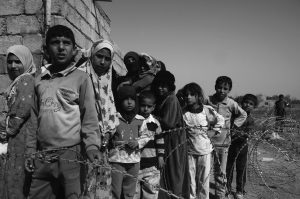
Medya and her family were placed into a resettlement program by the United Nations High Commissioner for Refugees (UNHCR) and granted a humanitarian refugee visa 4 months later. They then boarded a flight to Sydney, Australia. After spending a month in a refugee facility, they were resettled in Coffs Harbour. Other Yazidis refugees were resettled in Wagga Wagga, Brisbane and Toowoomba. The Coffs Harbour community have been very welcoming to their people and Medya is grateful that she is living there with her children. Meanwhile, her husband and sister are still in Iraq. Medya does not know what happened to them or whether they are still alive. She is in contact with some of her family members who are living under extreme circumstances. Medya heard that thousands of women and girls were forced into sexual slavery by ISIL and thousands of men were killed. She prays every day for their safety.
One of the world’s most threatened religious minorities, the Yazidis people are indigenous to Kurdistan and are predominately Kurdish-speaking. Yazidis people have a history of centuries of conflict with surrounding regions due to their unique religious beliefs, a combination of Judaism, Christianity, Islam and lesser-known Iranian religions (Allison, 2017). Their links to their homeland and ancestry are crucial to their faith. Yazidis society follows a caste system determined by birth and the Yazidis calendar is coloured by several festivals rich with culture and spirituality. They are often disadvantaged socially, economically, and educationally, having diverse religious customs that dictate how they interact with other established systems.
When they arrived in Australia, Medya was 32 weeks pregnant, Arin was 2 and Hedjar 17. The Multicultural Australia organisation and the case manager assigned to their relocation helped them when they arrived in Australia. Initially, they were housed in a motel on the outskirts of Coffs Harbour as it was difficult to find permanent accommodation. After 6 months, they moved to a small 3-bedroom house with a garden and leopard tree in the front yard. It was the most beautiful house Medya had ever seen. The family felt very lonely for some time, cut off by language and cultural barriers, however this changed when they connected with the Coffs Harbour community centre.
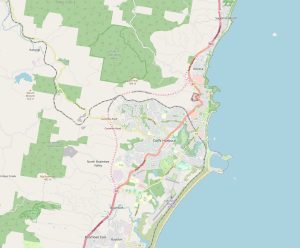
Shero family members
Medya: 43 years old
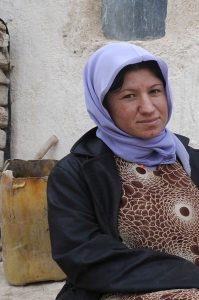
Medya is the matriarch of this family at 43 years old and identifies as female. Five weeks after they arrived in Australia, Medya delivered Fero at 37 weeks. Without family, the ability to speak English or drive, to get to hospital Medya had to call on the assistance of their case manager and 2 women from the community centre. Her experience was very different from the way she delivered her other babies in Iraq. It turned out that Fero was breech. Medya had not had any medical follow-ups with a doctor since very early in the pregnancy. Her delivery was traumatic, to the extent she sustained a fourth-degree perineal tear and post-partum haemorrhage. She had to undergo emergency surgery for repair of her anus. While Medya was very unwell after the birth, her new baby boy, Fero, was healthy, which gave her strength to recover from her surgery within 4 weeks. Her new friends at the community centre helped her by supporting her eldest son Hedjar, who was looking after Ari and bringing her to the hospital to visit Medya each day.
It has now been 7 years since Medya and her family arrived and resettled. While Medya has learned enough English to get through the essentials of daily life, she speaks Kurdish strictly to her family so that her beloved country and family are not forgotten. She is amazed how quickly and easily her children have adopted Australian language and culture. Medya is an excellent cook and enjoys exploring and expanding her abilities through her interactions with other refugee women at the Coffs Harbour community centre. She volunteers in the kitchen when the community centre hosts community events. This centre has been central to the rebuilding of her life. She now believes there is hope for her children’s future.
While there are very few Kurdish women Medya can share her hardship with, many other refugee women in the centre talk about the trauma they have experienced. This provides her with a sense of deep connection with other refugees. In a recent reconnection with members of her husband’s family who live in Lebanon, she learns they have heard no news of her sister or her husband. This is deeply troubling and upsetting for Medya. Now she has access to a Kurdish counsellor, which may help her talk about her experiences.
The repair of her anus and bladder has had long-term impacts on her bladder and bowel patterns and function, which is difficult for Medya to manage at times. Her strict religious practices and lack of representation by her husband make this more difficult as she does not feel confident to seek medical attention on her own. Medya has worked hard to find female specialists who can help and whom she feels able to trust with such a private aspect of her life.
Medya does not drive but knows the public transport system well now. She has taught her children to safely make their way to and from the local school. Her eldest son often takes her to where she must go when he is not working.
Hedjar: 25 years old
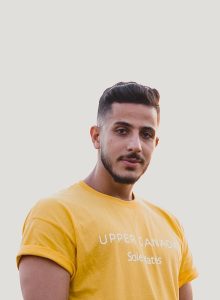
Hedjar is 25 years old and identifies as male. He is Medya’s eldest son and has taken on the role of the head of the household to support his mother. He has witnessed so much over the past 8 years; he was only 17 at the time of their escape. Since resettling in Australia, he has worked hard to learn the language and find a way to support the family financially. For the last few years he has been working as a trolley collector at the local supermarket while he studied English at TAFE. After graduating, he enrolled in a bookkeeping course, which he is nearly finished. He hopes to study business at university in the near future, as he has always had a way with numbers and wishes to provide for his family. After he had saved enough to take driving lessons and get his driver’s licence, he bought a small second-hand car. He is meticulous with keeping it clean and will tell off the children, especially Fero, if they do not respect it.
Hedjar’s other passion is music. In Iraq he often played the oud with his father. Now he is working to save enough money to buy one. He wants to be reminded of his father and the special memories they shared playing music together. Since arriving in Australia, Hedjar quickly learned to play the guitar after finding an old one lying around at the community centre. Bill, one of the volunteers, is a rocker from the past with a passion for blues and roots. Bill has been teaching Hedjar the guitar for several years. They have a very strong friendship that is meaningful to both of them. Bill and Hedjar have formed a band with other locals from the centre and play small gigs and functions in Coffs Harbour. Hedjar’s favourite is to play at weddings, as they remind him of the family gatherings they had at home in Iraq when he was a child.
Just before escaping for Lebanon, Hedjar began to have focal seizures and was diagnosed with post-traumatic epilepsy, a recurrent seizure disorder that can appear after head injury (Agrawal et. al., 2006). Medical staff suspect this occurred when he was attacked and shot in Iraq and did not receive the extensive medical care that such an injury requires. He has been on anti-epileptic medication for 2 years and is currently stable and able to drive again, which is essential for the family. Prior to receiving his medication, Hedjar’s epileptic events appeared to be triggered by stress and poor sleeping patterns. He usually finds it difficult to sleep restfully as he is still plagued by nightmares from his experiences in Iraq. He has not seen anyone for help with this yet because, while he and his mother often talk about what they went through, they prefer to be private about this. However, Hedjar has mentioned what happened to him to Bill, who has suggested he seek support through his connections in the community centre and that he would be willing to support him if he needed it. Hedjar is thinking about it.
Arin: 10 years old

Arin is 10 years old and a very sweet, intelligent, quiet little girl who is quite shy with strangers. Arin suffers from anxiety due to the years of disruption and danger she experienced as a very young child in Iraq. At one point the anxiety was so crippling that the family sought the support of a child psychologist, who has been working with Arin to manage it. She was only a toddler when they escaped Iraq. She suffered permanent damage to her feet and legs after fragments from a bomb blast damaged her muscles and skin. Arin was not treated until they arrived in Lebanon. This was the same bomb that killed 2 of her siblings and other family members. She suffered an incredible amount of pain as they could not often get access to, or afford medication to treat it. Arin is very self-conscious about her legs, which have suffered muscle wasting and strictures where the skin has been burned and healed without treatment. Since arriving in Australia, she has had one surgery to release the skin around her knee and will likely need more surgery as she grows. At school she needs to use a wheelchair for most of the day. She does not like using her crutches as they draw attention to the way she walks.
Arin is a very good artist at age 10, which her teacher has noticed. The school put her forward to be a part of a community art program which she enjoys very much. As part of her counselling for her anxiety, she uses art to express her feelings. She is particularly good at drawing and painting; she will happily sit for hours making figurines out of plasticine or learning how to make earrings with her mother’s Sudanese friends at the community centre. While she is well loved by her friends, she hasn’t yet invited anyone to her house or been to a sleepover. Arin doesn’t want to leave her family or have her friends see their home.
Fero: 6 years old

Fero is a cheeky little 6-year old who keeps the household lively. He was born prematurely at 37 weeks in Australia and his mother tells him he is a ‘strong fighter’. He proudly tells the story of how he is the only one in his family who was born in Australia. Although he is meeting almost all his growth milestones, Fero has several allergies to contend with, namely asthma, eczema and an allergy to penicillin, which they discovered when he was a baby after he developed a severe rash on his chest. He has a strict bath and cream routine for his skin to try to reduce the redness and itching, which is a constant source of frustration for both him and his mother.
Fero started year one this year at the local public primary school. While he has taken it all in his stride, he is quite boisterous and finds it difficult to sit still in class. The teacher is working with Medya and Hedjar to decide whether they need to explore his behaviour more deeply. For example, he could have some attention-deficit hyperactivity disorder (ADHD). His favourite time at school is lunchtime and sports when he can run around and kick the footy.
While Fero loves the beach, he has not yet learned to swim. The family cannot afford swimming lessons other than what is provided through the school program. He wants to be a surf life saver when he grows up as well as a policeman. He adores his big brother Hedjar, following him whenever he can. He often tries to convince his brother to take him for a ride in his car, which Fero absolutely loves.
References
Agrawal, A., Timothy, J., Pandit, L., & Manju, M. (2006). Post-traumatic epilepsy: An overview. Clinical Neurology and Neurosurgery, 108(5), 433-439. https://doi.org/10.1016/j.clineuro.2005.09.001
Allison, C. (2017). The Yazidis. In J. Barton (Ed.), Oxford research encyclopedia of religion. Oxford University Press. https://doi.org/10.1093/acrefore/9780199340378.013.254

